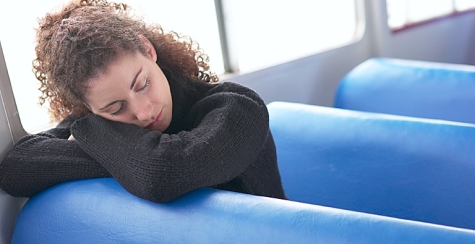Teenagers who stay up late during the school year are likely to have lower grades and more emotional problems than their morning lark counterparts, according to a study that looked at the long-term sleep habits of teens.
The study published in the Journal of Adolescent Health involved a large sample of teens from across the country. Researchers at the University of California, Berkeley looked at the teens’ academic records and reported bedtimes throughout their middle and high school years.
About 30 percent of the teens had bedtimes later than 11:30 p.m. on school days and 1:30 a.m. in the summertime. This group was unable to meet their recommended 9 hours of sleep during the school year. As a result, these teens had lower GPA scores than their peers and more reported behavioral problems.
During the summertime, students with later bedtimes were able to get 9 hours of sleep. These later bedtimes did not appear to affect their academic performance, though researchers noticed a link between later summer bedtimes and emotional problems in young adulthood.
Teenagers have a natural circadian tendency towards becoming night owls once they hit adolescence. Many have difficulty falling asleep early enough to get the full nine hours of sleep that they need to feel fully rested.
Extracurricular activities and schoolwork combined with teens’ desires to have extra free time at the end of the day may also keep teens from getting to bed on time. Evening use of electronics, such as smartphones, computers and videogames are also a factor.
It doesn’t help that in many school districts, classes start as early as 7:30 a.m. Some students who participate in athletics may be required to wake up much earlier to report to morning practice.
There’s a rising movement to push forward the start times to better accommodate teenagers’ sleep needs. Many parents across the country, along with advocacy groups such as Start School Later have led the charge. The group contends that public middle and high schools should start at 8 a.m. at the earliest.
Top education officials and thought leaders are starting to take notice as more of these type of findings come into focus.
In August, the Washington Post Editorial Board argued that, “Bleary-eyed teenagers cannot possibly be at their best when, as is the case in several school districts in Maryland and Virginia, they are expected to rise as early as 5:45 a.m. to meet their buses every weekday.”
Education Secretary Arne Duncan offered his support towards measures to push back morning start times over Twitter. He tweeted, “Common sense to improve student achievement that few have implemented: let teens sleep more, start school later.”
The tendency to stay up late and sleep in fades during early adulthood for many people. The people who remain night owls often face similar disadvantages over their careers.





